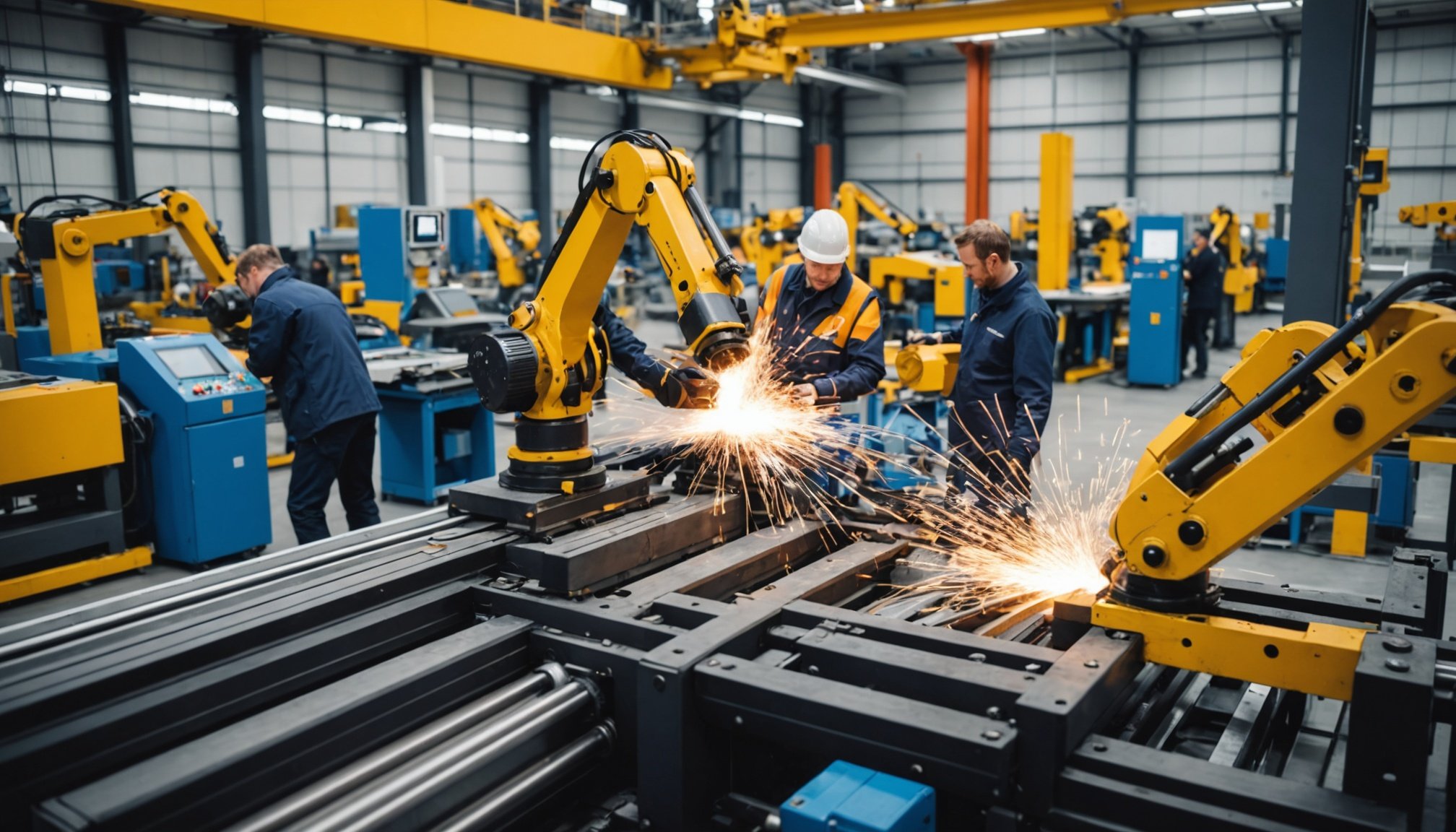Overview of Industry 4.0
Industry 4.0 represents the digital evolution that is profoundly transforming the manufacturing sector. This manufacturing shift, often termed the “Fourth Industrial Revolution,” combines advanced technologies such as IoT, AI, and robotics to create smart, interconnected systems. These systems enhance productivity, efficiency, and adaptability in manufacturing processes, enabling them to respond to global market demands swiftly.
Technological advancements are the backbone of this transformation, with smart sensors, autonomous robots, and big data analytics playing pivotal roles. These tools allow for real-time data collection and analysis, leading to improved decision-making and streamlined operations. UK manufacturers are particularly focused on these technologies, recognising their vital role in maintaining competitiveness on a global scale.
This might interest you : Elevate your uk marketing agency: key tactics to succeed in a shifting consumer landscape
The significance of adapting to global trends cannot be overstated. As international competitors embrace these innovations, UK manufacturers must also evolve to sustain their market positions. This adaptation involves more than just technology adoption; it requires a cultural shift towards continuous improvement and innovation across all levels of the industry. Embracing Industry 4.0 is not just about keeping pace— it’s about securing a strategic advantage in an increasingly digital world.
Key Tactics for Adapting to Industry 4.0
In the rapidly evolving landscape of Industry 4.0, manufacturing strategies are pivoting towards more innovative approaches to digital transformation and operational efficiency.
Also read : Empowering eco-friendly manufacturing: key approaches for uk producers to achieve sustainable practices
Embracing Automation and Robotics
Automation and robotics are revolutionising manufacturing by streamlining production processes. This innovation enhances productivity, reduces human error, and allows for more consistent quality. In the UK, several manufacturers have successfully implemented robotics to boost operational efficiency. For instance, Jaguar Land Rover has integrated advanced robots within their production lines, significantly decreasing the time needed for assembly and increasing overall output.
Leveraging IoT for Smart Manufacturing
The Internet of Things (IoT) is pivotal in enhancing data collection and analysis in manufacturing. IoT technologies allow real-time monitoring of equipment and product lines, enabling informed decisions that enhance efficiency. Rolls-Royce uses IoT to monitor engine performance, predicting potential failures before they occur, which minimises downtime and maximises operational efficiency.
Integrating Artificial Intelligence and Machine Learning
Artificial Intelligence (AI) plays a crucial role in optimising decision-making and predictive maintenance within manufacturing. AI-driven solutions analyse immense datasets to predict machinery issues, allowing proactive maintenance. Siemens has implemented AI to optimise production schedules, proving its effectiveness in enhancing operational efficiency and cutting down production costs.
This technological integration fosters a more responsive and adaptable manufacturing environment.
Emerging Technologies Shaping the Future
In the rapidly evolving landscape of UK manufacturing, key emerging technologies are spearheading transformative changes. These technologies are not only enhancing traditional methods but are also redefining the entire production and supply chain processes.
Tech trends such as the Internet of Things (IoT) and Artificial Intelligence (AI) are at the forefront of this innovation. IoT enables machines to communicate seamlessly, leading to smarter manufacturing environments. Meanwhile, AI optimises production schedules, improves quality control, and boosts operational efficiency.
Robotics and automation are also pivotal in driving innovation in manufacturing. They reduce human error, enhance precision, and enable 24/7 production cycles. In addition, digital twins simulate production processes in a virtual environment, allowing for real-time adjustments without disrupting actual operations.
The significance of cybersecurity cannot be overstated, particularly in the realm of Industry 4.0. With increased connectivity comes heightened vulnerability. Therefore, safeguarding networks and systems against cyber threats is imperative to maintain efficient and secure manufacturing processes.
In conclusion, these innovations are transforming how industries operate, offering immense potential for increased productivity and sustainable development. The challenge lies in integrating these technologies harmoniously while ensuring robust cybersecurity measures.
Market Trends and Insights
Market trends in the UK manufacturing sector have been significantly shaped by shifts in consumer demands and heightened focus on sustainability initiatives. In recent years, there’s been a growing consumer preference for environmentally friendly products, prompting manufacturers to adopt greener practices. This aligns with global trends, where sustainability is gaining central importance. Simultaneously, advancements in technology and Industry 4.0 are revolutionising efficiency and production capabilities, further defining the current market ethos.
Current Trends in UK Manufacturing
An emphasis on reducing carbon footprints and embracing renewable energy sources is evident across various manufacturers. Companies are increasingly integrating sustainable materials and circular economy models, aiming for decreased waste and increased resource efficiency. These strategies not only meet consumer expectations but also comply with stringent governmental regulations on emissions and sustainability.
Competitive Landscape and Opportunities
The UK market’s competitive landscape highlights diverse strategies, where manufacturers are leveraging digital transformation and automation to enhance operational efficiency. To thrive, it’s crucial for UK manufacturers to identify growth opportunities beyond local borders. Global partnerships and investments in innovation can pave the way for expansion. By staying attuned to these evolving market trends and industry insights, manufacturers can strategically position themselves to capture emerging global demands and maintain a competitive edge.
Challenges and Solutions for Transitioning Manufacturers
Manufacturers transitioning to Industry 4.0 often face significant manufacturing challenges. One of the primary issues is the integration of new technologies with existing systems. This can lead to technical inconsistencies that require complex resolutions. Furthermore, the shift may demand considerable investment in both time and resources, which can strain financial planning.
To address these challenges, solutions should focus on robust change management. Effective strategies include clear communication about goals and benefits to all stakeholders, fostering an environment that encourages learning and adaptation. Employee engagement is crucial; providing training and development opportunities ensures that the workforce feels equipped and confident to handle new technologies.
In the UK, a wealth of resources and support exist to assist manufacturers during this transitional phase. Organisations provide guidance on adopting solutions such as digital advancement grants and technological support schemes. Access to expertise and funding can alleviate some of the transitional burdens.
These strategies and resources are vital for fostering a successful transition, minimising the impact of manufacturing challenges, and harnessing the full potential of Industry 4.0.











